 A little while back, I had a few minutes to chat with Toronto’s Josh Bowen. Josh is an independent producer who had some recent success with Goodwin VS Badwin, a webseries being showcased on Mondo Media’s YouTube channel. GvsB has ranked up a solid chunk of numbers, and while it hasn’t been a breakout like Mondo’s Dick Figures, it’s more than fair to call it a success. One of the things about Josh’s accomplishment is the way he went about it. He worked outside what we’d call the system, here in Canada. He found people who believed in him and his project, he put together a business plan, and he raised the money to make his show.
A little while back, I had a few minutes to chat with Toronto’s Josh Bowen. Josh is an independent producer who had some recent success with Goodwin VS Badwin, a webseries being showcased on Mondo Media’s YouTube channel. GvsB has ranked up a solid chunk of numbers, and while it hasn’t been a breakout like Mondo’s Dick Figures, it’s more than fair to call it a success. One of the things about Josh’s accomplishment is the way he went about it. He worked outside what we’d call the system, here in Canada. He found people who believed in him and his project, he put together a business plan, and he raised the money to make his show.
Mv: Josh Bowen, a bit of background please, how did you come to animation?
JB: Well it all started with me taking Radio and Television Arts at Ryerson University. It was during my time at Ryerson that I started selling original music for film and TV at Bungalow 7 Productions. This job gave me the opportunity to meet a lot of producers in the animation business. It was from this experience that I started to develop my interest in cartoons. I started writing adult animated content in my spare time and eventually tried to sell it. One of the people I tried to sell to was, Peter Burton who was working at 20th Century FOX as a development director of adult animation. I was invited to LA to pitch a concept to him. Although the project never ended up going anywhere it was the start of the working relationship we have today.
MV: So you’re not a draw-er. We won’t hold that against you.
JB: Nope! I like to draw, but the only person that thinks I’m good at it is my mom…
MV: Moms are always a bit delusional when it comes to their kids.
JB: I loved to draw cartoons as a child. In fact, I have stacks and stacks of sketch books that I recently found and had the chance to look through. I think I’ve always been attracted to cartoons, but lost sight of my passion after a bad experience with my grade 7-art teacher.
MV: Want to get it off your chest?
JB: Sure! It’s a simple as she didn’t like me very much because I liked to do things my way… not much has changed! But like many art teachers she was trying to teach specific techniques, which had tremendous value. I just didn’t have any interest in it at that time in my life. All I wanted to do was draw cartoons. As a result I ended up getting failing grades on a lot of my art projects. In fact, the teacher called my dad one night and cried on the phone about me. She was clearly emotionally unstable and it was at that moment I lost my interest in art and gravitated toward my other passion in sports.
MV: Sports, to college, to writing, to pitching. I know you tried on a few different hats in animation for a while: some sales, biz dev, stuff like that
JB: Yeah, I was trying to find my place in this business. When you’re not an artist the path isn’t seamless. One of the big things I learned on the biz side is how to be a good creator. What I mean by that is I learned how to evaluate the needs of buyers to help construct a creative strategy. For example, if you’re pitching a show to FOX there are certain pillars and concepts that they are looking for in your creative product:
1) Family Dynamic
2) Child element
3) pop culture relevance
4) Conventional family unit
5) non-sequitur humour
I learned how to look at the individual needs of the broadcaster, and to create my shows around them.
MV: To allow the market to set parameters for your creativity, and work within them.
JB: Exactly. And know who you’re going to pitch to before you create.
MV: What was your first step with Goodwin VS Badwin? Did you identify Mondo as a target first, or did you have an idea and go looking for somewhere to put it?
JB: Goodwin and Badwin are characters from a series that Peter and I pitched to FOX. They really stood out to me and I thought they’d be perfect for the irreverent nature of Mondo’s short series channel. Furthermore, Goodwin and Badwin possess the characteristics of the classic yin and yang dynamic, which has been proven to be effective in short format content. Eg: Itchy and Scratchy, Spy vs. Spy, Dick Figures (Red vs. Blue)
MV: yeah, we’ve seen it before, but it never gets tired, so for your first stab, why try to reinvent the wheel?
JB: Unless you’re creating an art piece then I would advise against reinventing the wheel. If you want to be commercially successful, that doesn’t mean don’t be creative, but rather find a way to bridge the gap between business and creativity. After all, that balance is what creates the most relatable content. I privately financed the series, so it had to connect to viewers.
MV: Give me some play by play on how you came to your business model.
JB: I went to Mondo and asked them if they would distribute my show if I raised all of the financing for it. I knew that attaching Mondo would help me raise capital.
MV: Why were you so set on self-financing?
JB: The Canadian entertainment business model is flawed. First of all, despite an exorbitant number of public grants, it’s still difficult for first time producers to access public funds, which makes private investment a more viable funding option for these type of producers. Furthermore, I believe that producers have become far too dependent on tax credits and government financing. Don’t get me wrong, these forms of public financing are necessary and should be utilized, but a business shouldn’t be able to survive solely on government assistance. As a result, I think that many Canadian Producers have lost some of their entrepreneurial spirit as it relates to financing creative projects. Canadian producers aren’t forced to think outside the box like Americans when it comes to finding creative ways to finance projects. The business side of animation can be just as creative as the content, but we aren’t forced to think in a way that promotes that way of thinking. Therefore, I believe that producers need to employ a hybrid-funding model that utilizes a combination of public and private funds to finance creative endeavors. They’re people in this industry that will disagree with me whole-heartedly, but if this is a business then we should treat it as such.
MV: So, the same as if you wanted to go into the hardware business or buy a Starbucks franchise.
JB: Absolutely! And let me just add that if we manage to get away from these linear and often one dimensional financing models, this industry will become much more creator driven in the years to come. As creators become more entrepreneurial and start using tools like IndieGoGo, or creating content for creator-driven YouTube channels, these creators are going to be the ones calling the shots.
MV: And to demonstrate a return on their investment?
JB: ROI is the most important thing to any investor. Having Mondo on board as a partner I was able to show potential investors the business opportunity and traffic we would be able to drive toward the content. After I showed them the business plan, I pitched the creative. As investors, they were less interested in the creative, but trusted my understanding of the business and needs of the buyer to create a viable show.
MV: Using Mondo’s ad revenue-based model?
JB: Among other financial opportunities, but there is something important to consider: I was not asking for a million dollars. Rather, I was asking for 30K amongst the group of investors.
MV: Right. So: a low investment point and demonstratable returns. Not crazy.
JB: Not at all, but instead of making just a demo, I created a mini series of 6 episodes, which would allow me to build an audience, rather than just be a one off. Given that it is a mini series this enables opportunities to spin off into a long form series or be packaged within a series of mini shows into a 22 minute broadcast slot.
MV: And you had Mondo on board from the start?
JB: I didn’t really pitch Mondo, but rather showed them how the show was developing, as we made it. I mean, we had discussed the show, we shared scripts, and voice records, but the beauty of Mondo is that they let creators do what they do – create. I recommend to anybody with an adult animated series to consider adapting it into a mini series pitch for Mondo.
MV: But they didn’t invest.
MV: You basically did it for free.
JB: Yes.
MV: and what’s the trade off?
JB: I get back end on ad revenue. Not to mention, Mondo has over 1 million subscribers that I otherwise wouldn’t have access too.
MV: So they bring eyes. And what do they get?
JB: I can’t discuss that, but I can tell you that the deal is more than fair.
MV: Ok, but is there some ownership split?
JB: Nope. We own the IP. Mondo only collects a portion of the Google ad revenue, which means that our investors have tremendous back end and future licensing opportunity.
MV: Nice. Back to the creative then. You’ve got investors, and an outlet. Now you have to make six episodes, for 30 grand. Six 3 minute eps?
JB: Approximately, yes.
MV: Ok, so how the hell do you do that? You and Peter are scripting. I’m assuming that part is sweat equity.
JB: Yes. It’s tough, but I cut my partners in on the back end too. They take a reduced rate, but get a portion of the back-end.
MV: Ok, so how did you find those partners? JB: Well, I met Peter when he was at FOX, and we hit it off. I worked for Gene Fowler at

Loogaroo, and Gene suggested we bring Tony Grillo from Flinch Studios into the mix.
MV: So who did what?
JB: Peter and I co-created and wrote the series. I produced the series. Tony directed in every sense of the word and Gene designed the show. It’s interesting because we are scattered all over North America and we made this thing happen. In fact, I have never met Tony in person, which is kind of bizarre, but demonstrates the possibilities when it comes to production.
MV: Really? He’s great. Honorary Canadian.
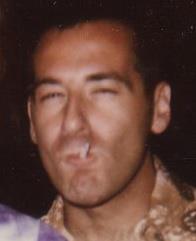
JB: He’s amazing! He works like a horse and has amazing vision. It has been a really cool process, managing a production remotely. Don’t get me wrong, it can be difficult, but if you trust your team, you won’t have a problem. Ego has to take a backseat when you’re doing this type of production.
MV: From a production standpoint, there are hurdles, and one of the biggest ones for the production team is revisions, you must be giving your team a fair bit of latitude in order to keep turnaround running smoothly.
JB: Not only are they my team, they’re my partners. And I think that’s the most important thing. You need to trust your partners.
MV: But someone has to have final approval.
JB: That’s me.
MV: So you let them run with their respective departments?
JB: I crack the whip when I need to, but rarely does it occur.
MV: Trust in Gene’s design sense, trust in Tony’s ability to deliver a finished product and trust that what you get is the best you can get for the time/money?
JB: Totally. Gene is one of the best designers on this Earth and Tony will not sleep until he delivers. We have been so efficient with our budget I’m actually amazed, and somewhat surprised. But it’s like anything in life, when you have more money, you spend more money. When you have less money, you spend less money.
MV: Ok, so you’ve got episodes, and Mondo schedules them. How’d they do?
JB: We are thrilled with the shows success! Mondo is happy with the results and we have amassed over 550K in views on the first 4 episodes. In fact, the show has done so well that we are producing a total of 10 episodes now. MV: Congrats! JB: Thanks! MV: This must be making your investors happy.
JB: They’re thrilled, to say the least! They know the value is in the brand and the opportunities producing more episodes will present. MV: So you’re raising money for 4 more?
JB: Reinvesting and raising money, a combination. I should add that Canada has suffered to produce adult animated content because of parody laws. They have caused us to lag behind the states in the genre. It’s just another reason why adult animation producers should steer away from government funding when it comes to this type of content. Although, I heard this law may have just recently changed.
MV: And what now? Merch?
JB: Merch., a spin off series, licensing, a game…
MV: Same model?
JB: Somewhat
MV: Raise the money? Reinvest?
JB: The series will be fully funded, but there are a lot of variables being worked out at this point in time.
MV: I guess we’ll have to stay tuned.
JB: Yeah, I would happy to discuss it with you when everything has been finalized.
We’ll talk to Josh again as things progress. I’m really anxious to see how his financing model pays off.
In the meantime, in keeping with putting faces to names, I told Josh to send me a picture of himself or I’d simply raid his facebook pics. When no photo was forthcoming, I did my part and dug up these beauties.

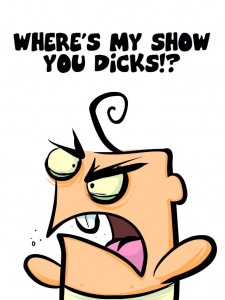
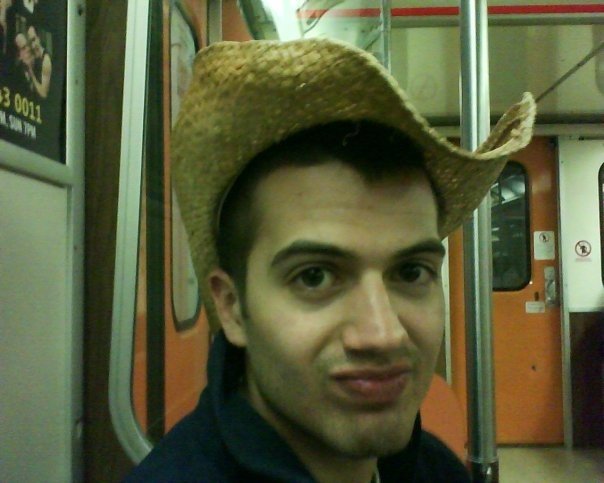
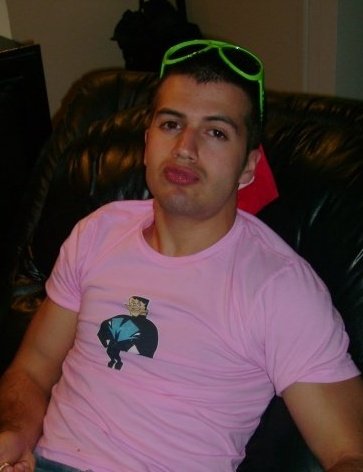




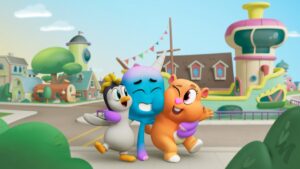


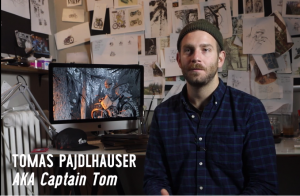
Yay for Josh Bowen nudey pics!
The “nudey pics” Gene mentions were only half-nude, and were only up for an hour. Any of you who are curious are going to have to “friend” Josh on Facebook to get a peek.
Very funny!